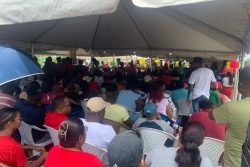Introduction
In introducing this subject last week Business Page sought to explain how Transparency International, the international non-governmental organization, compiles its annual Corruption Perception Index. For the benefit of readers who may have missed it, the 2008 Index ranks Guyana at a lowly 126 out of a total of 180 countries surveyed, with a score of 2.6 out of 10. As we indicated last week, in this second part, we turn our attention to why and how the attitude of the Government reflected by the cavalier statement of Dr. Luncheon that the Government would work in the same mode not only contributes to the perception of corruption but quite likely to actual corruption in Guyana.
For the purpose of this article we will look at the performance of the relevant political structure, the propriety, accountability and transparency of public spending, procurement, executive behaviour, the capacity and independence of the oversight mechanisms established to identify, punish and prevent corruption such as the Audit Office, the Public Accounts Committee and the Integrity Commission as well as the role and contribution of civil society. What we see is a depressing tale of resigned powerlessness and apathy to corruption and impropriety from top to bottom – from the way key provisions of the Constitution continue to be ignored with impunity at the level of the presidency, the routine demands for bribes and kickbacks by police and customs officials whose boss in defeat and frustration appealed to the public not to give his staff any more bribes, to the minibus driver who must perforce give a $1,000 to the traffic cop.
Party accountability
Let us look first at our political arrangements. Governments come out of political parties but these must be the only members’ organisations where there is no financial accountability and where members are not given access to even basic financial information, let alone formal reports. There is a curious fascination about the sources of their income, the identity of the select few who control their cash and how the income and expenditure are accounted for. So embedded is this absence of controls and financial accountability and so normal is it that parties behave as though accountability does not exist and that there is no expectation among members for any form of reporting. This can allow the financing of political parties by drug dealers and tax cheats to go unnoticed and the buying of favours for the donors, to be returned in one form or another including “immunity” in their tax affairs. This danger is particularly evident at general elections time when huge funds seem to come from nowhere while our Elections Commissioners seem unconcerned that the relevant law is out-of-date and used as an excuse for totally ignoring it. It is unlikely that any of the commissioners would dare to suggest that the law be updated and enforced. The possibilities for financial lawlessness and what the PPP/Civic 1992 Manifesto referred to as “dishonest electoral practices” and corruption are therefore endless. To call for proper legislation would be an invaluable national service which a GECOM Commissioner can render this country.
It should not be a surprise therefore that the attitude evident in the administration of the party finances is often carried over into public office. But even if we were to consider political parties outside of the pale of accountability – which they ought not to be – what about the rest of the country including most importantly those with the power to raise taxes from the people and the duty to spend it in a fiscally responsible and financially transparent manner? That duty includes waging “war against corruption which has seeped into every corner of our national life and is destroying the morals and morale not only of the corrupt but of all our people” – to use the words of the PPP/Civic 1992 Manifesto. That war requires an adequate institutional framework with reasonably capable and honest persons operating a system that has sufficient checks and balances including strong oversight and regulatory bodies. Absent these, the door is wide open for abuse and corruption.
Promises and delivery
It seemed for a while that these minimum requirements were recognised and that serious steps would be taken to address the problems. The 1992 Manifesto provided an excellent framework and statement of commitment. These were followed by changes to the national Constitution and some new laws. The changes have turned out to be more cosmetic than real and many consider that the cost and impact of corruption now is higher than it was fifteen years ago. Year after year, the Constitutional requirement that all public moneys be paid into the Consolidated Fund has been ignored in respect of the Lotto Funds which seem to be available for utilization at the President’s pleasure, since he has no such authority in law. Instead of taking remedial action, the Government has found another avenue for similar non-accounting and questionable spending. And that is in respect of the substantial sums collected and spent by the Privatisation Unit from privatisation and rentals of public property.
Recognising that the Government over a sustained period has been the largest procurer of goods and services, and that any control of corruption requires a strict regime of oversight of the procedures to ensure that procurement is done in a “fair, equitable, transparent, competitive and cost effective manner”, the revised Constitution makes provision for an independent, impartial Public Procurement Commission to be appointed by the President. Not only has this not been done but the Parliament has passed not one but two Procurement Acts placing procurement under a political head and rendering the Commission effectively redundant.
Integrity
Like with procurement so with integrity. Two Acts have failed to do the trick (no pun intended) and from its outset the Integrity Commission has been a failure if not a farce. We recall the wife of a later discredited Minister being appointed a commissioner by the Government but even more ludicrous the information is that the Chairman or ex-Chairman Bishop Randolph George resigned but that his resignation was not accepted by the President. It seems that the Commission is non-functional or at best dysfunctional with a membership that inspires no confidence and that seems to have no accountability other than to the President who has supervisory authority over the Commission. Indeed the Act allows the President to step in and request information from declarants and to publish their names and to hold formal enquiries. Given the scope of this legislation, covering as it does members of the National Assembly, the judiciary, public officers, local government officers, presidential advisors etc., it is incredible that there is no report of the Commission or the President publishing the fact that a person has failed to file his declaration under the Act, or of the Commission having held, since its establishment a single inquiry into any person. And is it a “nancy story” that no one has ever been charged with the new offence created by the Act of failing to account for their assets?
It would be an act of integrity if Bishop George, a respected man of the cloth and one who contributed to the return to democratic elections, would tell the nation what really is going on. Incredibly, calls to the Commission’s office are referred to the Office of the President!
Financial oversight
Then there is the Public Accounts Committee (PAC) of the National Assembly with the principal task of doing follow-up work on the report of the Audit Office. A leading member of that Committee has lamented the limited powers of the PAC but the public can legitimately ask whether that body does enough not only within its limited authority but whether it is sufficiently aggressive in pursuing its mandate. The combination of an Audit Office with the range of weaknesses identified above and a PAC without the expertise or the power to compensate for those weaknesses increases the risk of corruption succeeding without detection.
The two major executing entities for accounting for and overseeing public expenditure are the Audit Office and the Accountant General’s Department. The weaknesses in these outfits were long recognized but sixteen years after the Government pledged to the nation and the voters to strengthen the Audit Office and the Accountant General’s Department, these remain as starved of resources as they ever were while yet being called upon to manage and supervise vastly larger sums of money. After all these years, the Accountant General’s Department cannot control bank accounts of billions of dollars and the financial statements that it submits for audits are incomplete and in many cases incorrect.
Business Page of August 31 and September 7, 2008 highlighted some of the glaring weaknesses in the Audit Office including being understaffed by persons who are under-qualified, with serious problems of professional independence, glaring conflicts of interest and consistent failure to meet its constitutional mandate for reporting to the nation within a defined timeframe. Its 2006 report speaks as much about its own inadequacies as it does about the public finances of the country. Years after, it is still to publish its report on the money that was received and disbursed on the 2005 Flood and there are concerns that the same is happening with the 2006 Cricket World Cup accounting. If the Audit Office is so handicapped that it is several years in arrears in respect of several of its statutory obligations, when will it detect any occurrences of fraud and corruption? And if it has to spend its time on what in a normal situation would be regarded as basic such as bank reconciliations, it will not have time even if it had the other resources to deal with the serious control issues. The Office seems to lack the competence, independence or the confidence to scent corruption and there has been not a single case over the past several years of the Audit Office pursuing any incident of corruption of its own initiative.
Custom
There is such helplessness over corruption in the Customs and Trade Administration that its head is now appealing to the public to help in curbing corruption there. That statement is an indictment of the entire GRA and directly Colonel Ramsarup whose appointment was considered by many as usurpation of the role of the GRA Board by the President. The public waits with bated breath to see what action the Government will take to deal with the Department.
It would be unfair to hold public servants entirely responsible as the failures of their political bosses are in many cases worse. Why is the Minister of Finance not held accountable when he consistently fails to present to the National Assembly his half-year report within the sixty days deadline? The President is allowed to handle hundreds of millions of dollars without any authority whatsoever and creates for himself the supervisory responsibility over persons accountable only to him. The bloating of the number of ministries and departments, appointments and salaries outside the public service rules and an explosion of positions in the Office of the President create huge problems of adequate supervision and opportunities for corruption.
Large part of the problem
Add to all of these major institutional weaknesses, the Government’s willingness to pass legislation tailor-made for the President’s friend and to facilitate plea bargaining by its supporters, the belief that the Government is not at all serious about corruption gains credibility and sympathy. On the other hand the Government has strongly resisted calls for a Freedom of Information Act which it promised in its 1997 Manifesto and arrogates unto itself complete ownership and control of the state media and resources which it had promised to open. Not only has the Government shown a serious breach of faith but this complete control over activities and information on their conduct has dangerous implications for corruption since any government would be reluctant to embarrass itself over any corruption involving those near and dear to its political heart.
The problem is that by his style and obsession with micro-management, everything including allegations of corruption, the latest example being Fidelity/GRA and wastage (the Bridge) has to wait on the President. The trouble for us here is as the evidence shows the President is a large part of the problem.
Next week we will look for some solutions.






